★★★★
“The name’s Widow. Black Widow…”
 I said it in my review of Captain Marvel, but it probably bears repeating here. I’m basically completely unfamiliar with the Marvel Cinematic Universe. Avengers: Infinity War? It may have become the biggest film in cinema history, but I’ve never seen it, and that’s par for the course. Of the 13 MCU films released since the beginning of 2015, I have watched just three. So if this required any prior knowledge, or information not present in the actual movie, I was going to be hosed. Another concern coming in, stemmed from one of those three movies: Captain Marvel. It was the epitome of the dumb comic-book film, and more a chore than a pleasure.
I said it in my review of Captain Marvel, but it probably bears repeating here. I’m basically completely unfamiliar with the Marvel Cinematic Universe. Avengers: Infinity War? It may have become the biggest film in cinema history, but I’ve never seen it, and that’s par for the course. Of the 13 MCU films released since the beginning of 2015, I have watched just three. So if this required any prior knowledge, or information not present in the actual movie, I was going to be hosed. Another concern coming in, stemmed from one of those three movies: Captain Marvel. It was the epitome of the dumb comic-book film, and more a chore than a pleasure.
This had been long-delayed too, and that’s never a good sign, though it’s hard to blame the makers in this case. It was originally slated for release in May 2020, but of course, COVID-19 scuppered that, causing several reschedulings. The split release, simultaneously coming out in theatres and on streaming service Disney+, also came as a bit of a red flag. That’s because I’ve found films which debuted on streaming have largely been underwhelming. From Mulan through Wonder Woman 1984, as well as non-GWG entries like Godzilla vs. Kong and Mortal Kombat, the results haven’t impressed me. Could Black Widow buck the trend and deliver the summer box-office blockbuster which never happened last year? Well, if you counted the stars at the top, you’ll probably have worked out that it did, more or less avoiding the potential pitfalls.
However, it has also become the first four-star film not to get our seal of approval. Put simply, while it delivered 2+ hours of very solid entertainment, I have no interest in seeing it again. To me, that is a key element in awarding a seal; the film must be one capable of getting (and standing up to) repeat viewings. This didn’t – though again, I want to stress I’d be more than happy to go see the future installments, which seem highly likely to follow. I think it was mostly a lack of emotional involvement which capped my appreciation for it. While a fine, well-crafted spectacle, that does work as a stand-alone film, I still felt like I had arrived in the middle of the show. For example, a relatively brief explanation of her origins in a nineties Russian sleeper cell is followed by “21 years later,” and that’s an awful lot of water under the bridge.
Clearly, a lot of significant stuff had happened in that time. Piecing the parts together, it appears the two “sisters” from the sleeper cell, Natasha Romanoff (Johansson) and Yelena Belova (Pugh), became part of the “Red Room” program to create super-soldiers. Natasha defected back to the West to become part of SHIELD, and killed Dreykov, the man in charge. But Yelena remained in the system, until an encounter with a gas that undid her mind-control. She sent a batch of the gas to Natasha, which brought her into the sights of Dreykov, who was not so dead as previously assumed. He is very keen to get the antidote to his programming back under control, but Natasha and Yelena decide to take the fight to him instead. However, they need to start by finding out the Red Room’s location, which will involve an awkward “family re-union” with their pseudo-Mom (Weisz) and crypto-Dad (Harbour).
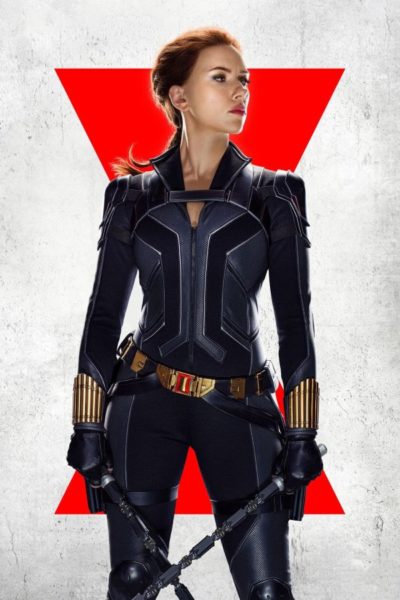 I was talking to Dieter about the film, which he had already seen (in the cinema, the mad, impetuous man!). He said it resembled “a classical spy-ploitation movie, like Bond movies might look today, if there hasn’t been that strong change in style and towards more realism with the Craig era.” That raised an eyebrow for me, and certainly didn’t seem a typical Marvel film approach. But having now seen it myself, I can definitely see where that’s coming from. In particular, I felt that Dreykov (played by British heavy Ray Winstone) would have fitted right in as a villain from that ‘classic Bond’ era. His lair makes the one inside a volcano from You Only Live Twice look like a doll’s house, and he even makes the classic, “Now you are helpless in my power, let me over-explain things to you” mistake. Notably, there’s a scene early on where Natasha is watching Moonraker on her lap-top, so I very much suspect none of this is by accident.
I was talking to Dieter about the film, which he had already seen (in the cinema, the mad, impetuous man!). He said it resembled “a classical spy-ploitation movie, like Bond movies might look today, if there hasn’t been that strong change in style and towards more realism with the Craig era.” That raised an eyebrow for me, and certainly didn’t seem a typical Marvel film approach. But having now seen it myself, I can definitely see where that’s coming from. In particular, I felt that Dreykov (played by British heavy Ray Winstone) would have fitted right in as a villain from that ‘classic Bond’ era. His lair makes the one inside a volcano from You Only Live Twice look like a doll’s house, and he even makes the classic, “Now you are helpless in my power, let me over-explain things to you” mistake. Notably, there’s a scene early on where Natasha is watching Moonraker on her lap-top, so I very much suspect none of this is by accident.
A couple of other elements also seem to echo Bond. Natasha has a somewhat Q-like “fixer”, Mason (O-T Fagbenle), who keep her supplied and gets irritated by her more outrageous demands. Dreykov has a monstrous and hyperviolent sidekick; despite her gender, she’s not unlike Jaws, who appears in the Moonraker clip mentioned above. Like him, she is won over to the side of good by kindness. There’s also a dry humour present, which does hark back to the days of Roger Moore. Much of this comes from Harbour’s character, but Yelena also has a self-effacing wit. For example, she rags on Natasha about her fight poses, though inevitably, subsequently finds herself in the same posture. After the dour Captain Marvel, a little appreciation of the underlying silliness which is embodied by the comic-book genre, goes a surprisingly long way.
Indeed, I would not mind if, as the post-credit scene implies, Yelena becomes Black Widow going forward. [Though that scene was all but entirely lost on me, I believe a change is needed, due to things which happened in films I haven’t watched… He said vaguely!] Pugh, whom we enjoyed seeing on this site in Fighting With My Family, brings a no-nonsense approach to her character that I really liked. Johannson may, despite her complaints, have been getting paid the big bucks here, but I’d rather see Pugh step into the PVC body-suit going forward. Admittedly, I’d also rather see more genuine stunt-work and less obvious CGI. While it’s understandable at some points, e.g. the climax, there were times where it felt like a character couldn’t walk down a corridor without it being rendered against a green screen. I think I may be shouting at clouds in this department, however…
All told though, it’s the first film I’ve seen in a long time which made me at least somewhat sorry I hadn’t seen it at the movies. It has been about 20 months since my last cinema outing, and I was beginning to wonder if I’d ever again miss the theatrical experience. Black Widow has proven otherwise, so we’ll see if this does translate into an actual movie-going experience down the road.
Dir: Cate Shortland
Star: Scarlett Johansson, Florence Pugh, Rachel Weisz, David Harbour
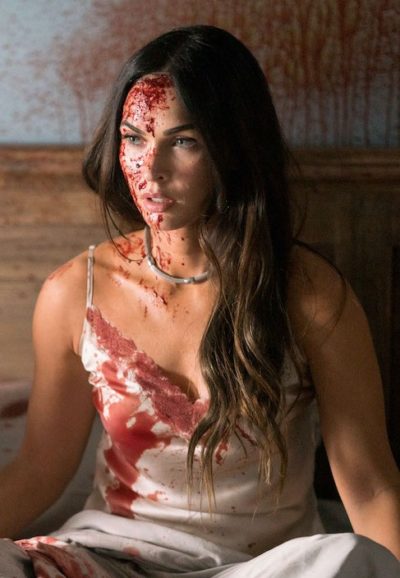 I kinda agonized, for far longer than I should have, over whether this was a 3-star or 2½-star film. It’s probably 2¾. Or perhaps 2 5/8. No, 2 11/16. In the end though, it doesn’t matter. It’s just another in Megan Fox’s attempts to become the next Angelina Jolie, following in the footsteps of the similarly okay but not exactly memorable Rogue. Indeed, I initially thought this was by the same director, but turns out it’s a different director who uses initials in lieu of a first name. Anyway, with this one now available on Netflix, it will likely raise Fox’s action-actress profile. In terms of current rankings, she probably moves ahead of Ruby Rose in the rankings. Though that’s not exactly difficult.
I kinda agonized, for far longer than I should have, over whether this was a 3-star or 2½-star film. It’s probably 2¾. Or perhaps 2 5/8. No, 2 11/16. In the end though, it doesn’t matter. It’s just another in Megan Fox’s attempts to become the next Angelina Jolie, following in the footsteps of the similarly okay but not exactly memorable Rogue. Indeed, I initially thought this was by the same director, but turns out it’s a different director who uses initials in lieu of a first name. Anyway, with this one now available on Netflix, it will likely raise Fox’s action-actress profile. In terms of current rankings, she probably moves ahead of Ruby Rose in the rankings. Though that’s not exactly difficult.




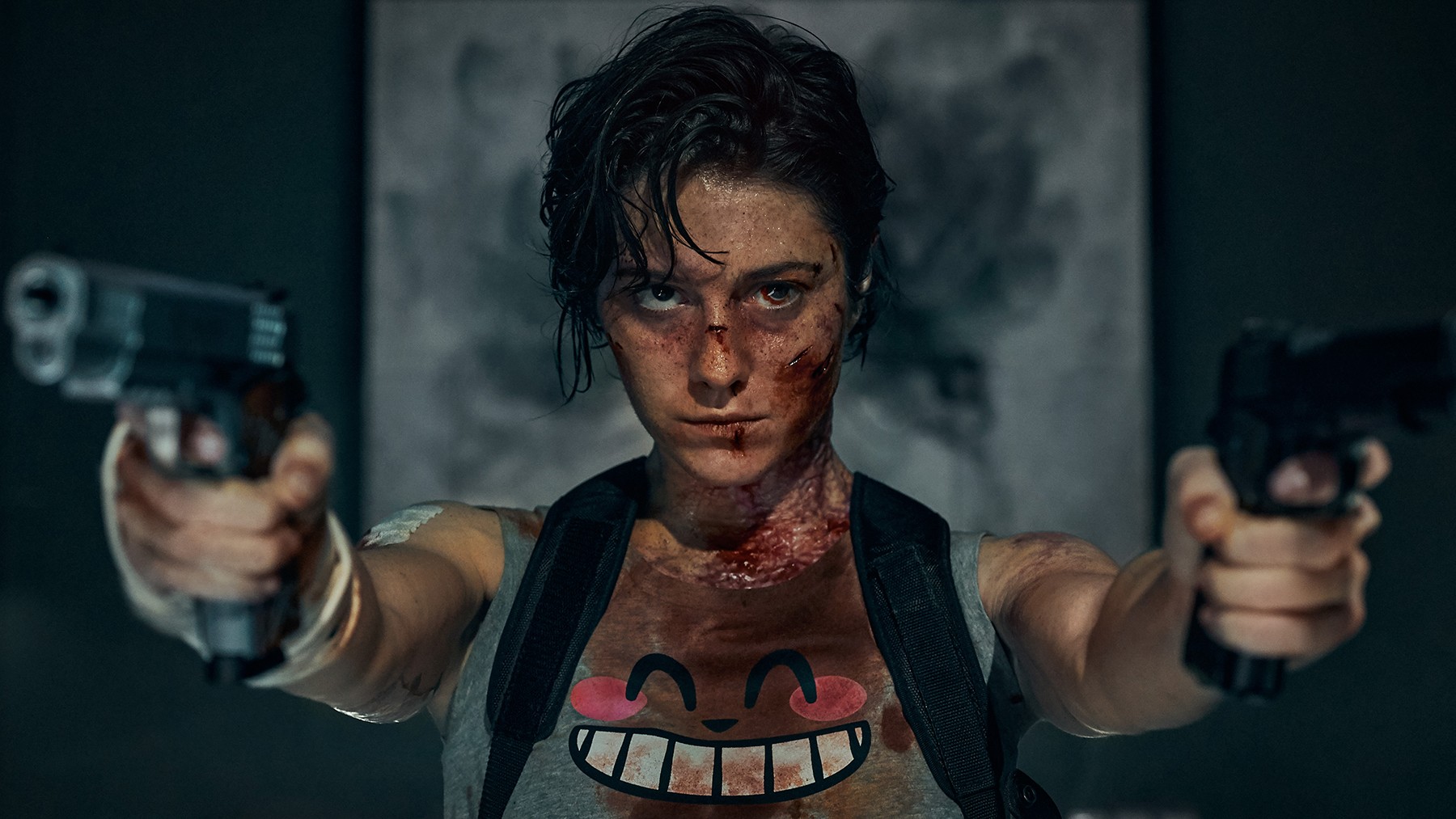 ★★★
★★★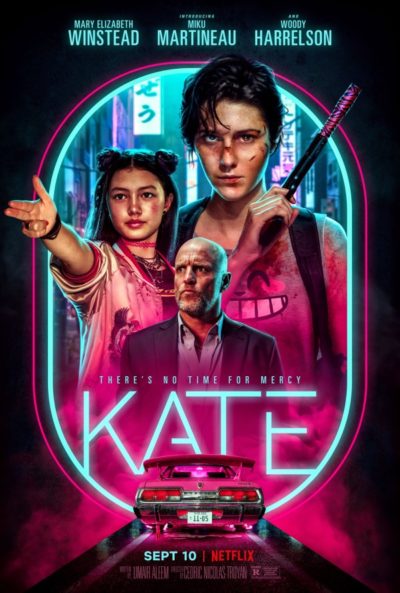 There is also, quite often, some kind of emotional resonance, in the cases where the child is not biologically related [when that is the case, you don’t typically need or get any more explanation, blood being thicker than water]. Maybe the kid acts as a surrogate, a replacement for one previously lost (Alien), or the heroine could never have. Or if a girl, the protagonist can perhaps see a younger version of herself. The other common theme is the use of the child as a key, to unlock the adult. Often, the latter has lost her humanity, typically through harsh circumstances, becoming largely a lone figure, with her emotions suppressed. The “childlike innocence” of the young person, to use a cliché, can be used as a psychological crowbar, pricing open the hard shell of the grown-up, allowing them to reconnect with their humanity. The more emotionally-driven immaturity also stands in contrast to the adult’s stoicism, often to an extreme degree.
There is also, quite often, some kind of emotional resonance, in the cases where the child is not biologically related [when that is the case, you don’t typically need or get any more explanation, blood being thicker than water]. Maybe the kid acts as a surrogate, a replacement for one previously lost (Alien), or the heroine could never have. Or if a girl, the protagonist can perhaps see a younger version of herself. The other common theme is the use of the child as a key, to unlock the adult. Often, the latter has lost her humanity, typically through harsh circumstances, becoming largely a lone figure, with her emotions suppressed. The “childlike innocence” of the young person, to use a cliché, can be used as a psychological crowbar, pricing open the hard shell of the grown-up, allowing them to reconnect with their humanity. The more emotionally-driven immaturity also stands in contrast to the adult’s stoicism, often to an extreme degree. 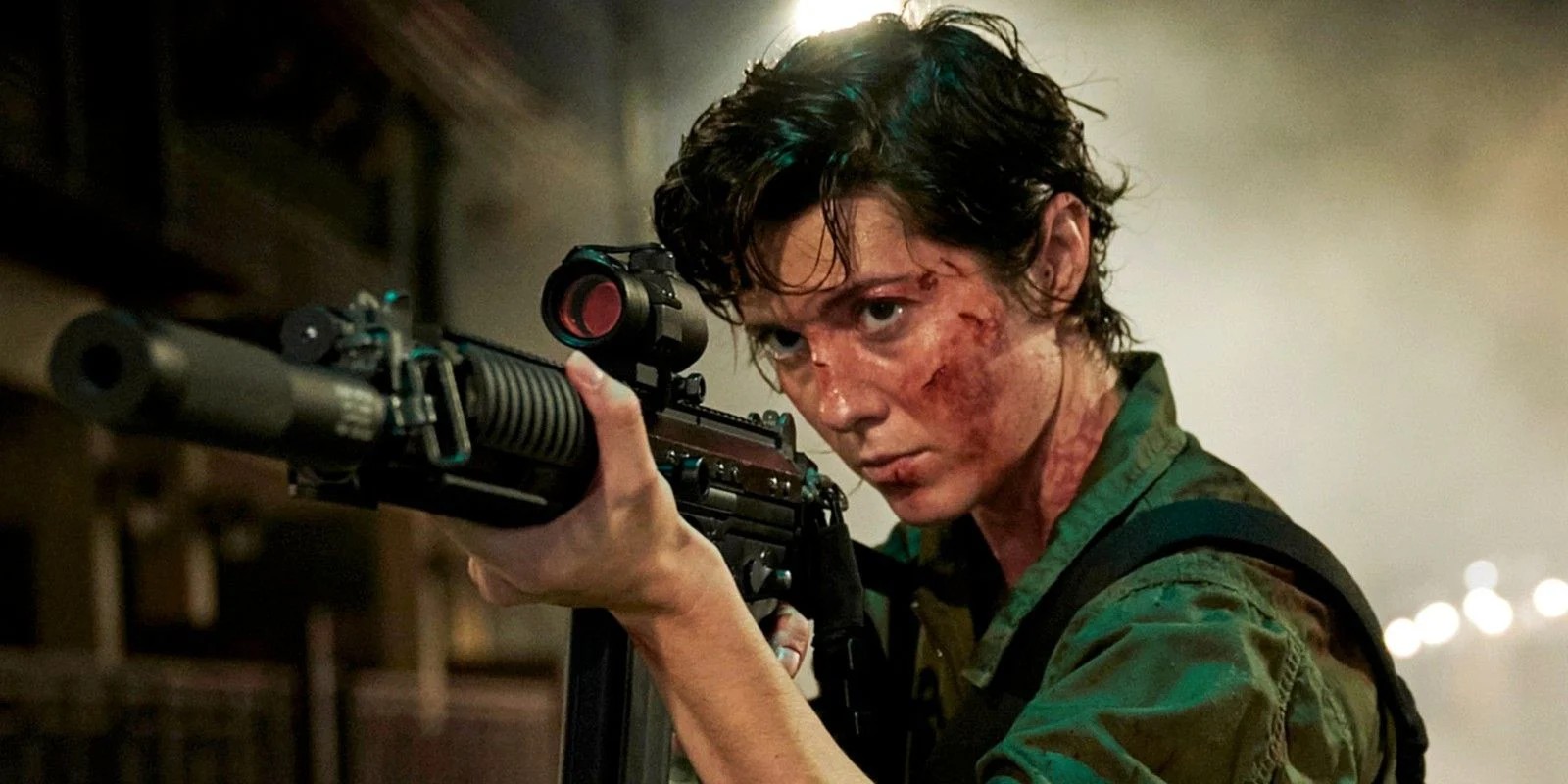

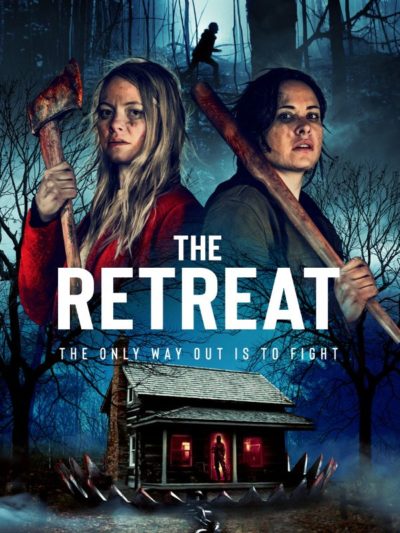 After the unexpected pleasures of
After the unexpected pleasures of 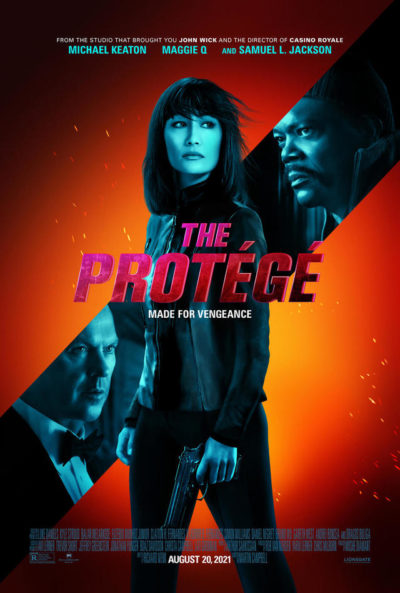 It’s nice to see Maggie Q get back into the action genre again. It’s where she achieved renown – most obviously in the second
It’s nice to see Maggie Q get back into the action genre again. It’s where she achieved renown – most obviously in the second 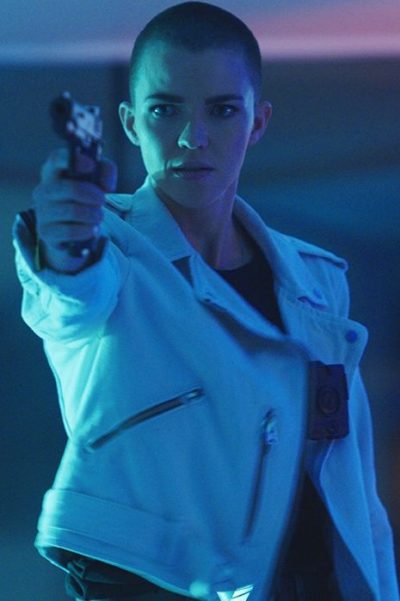 I want to like Rose, who seems to be making a concerted effort to become an action heroine. It hasn’t always worked out – see
I want to like Rose, who seems to be making a concerted effort to become an action heroine. It hasn’t always worked out – see 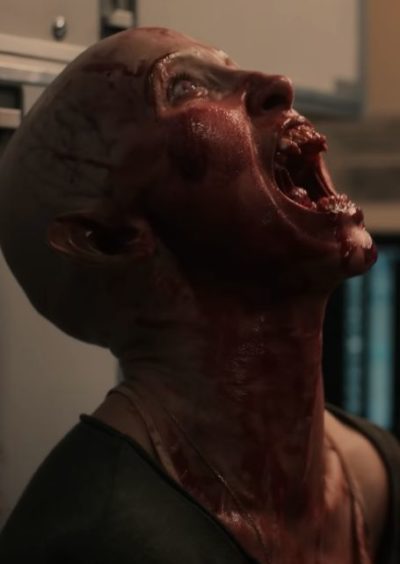
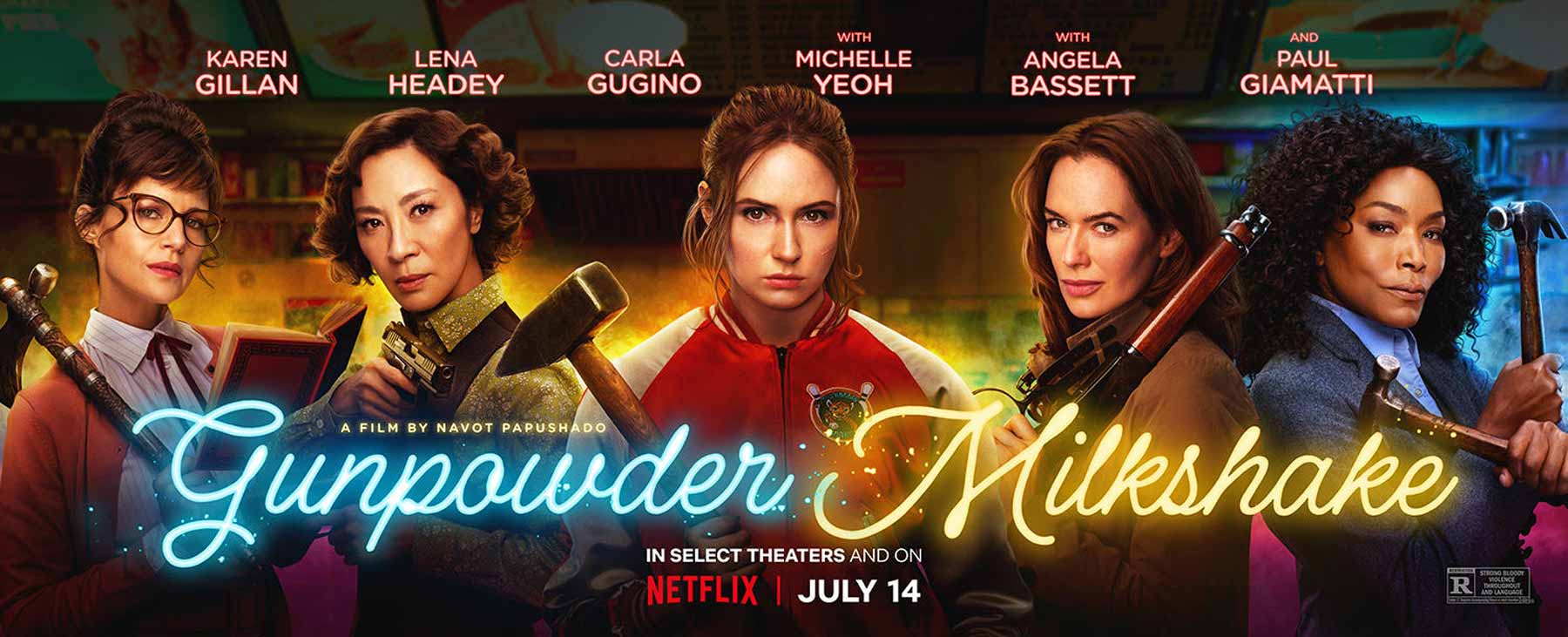 ★★★★
★★★★ Yeah, it’s kinda like that. As in John Wick, the hero(ine) is an assassin for hire, in a world where there exists a significant infrastructure of support for hitmen and hitwomen. After they fall foul of the wrong people, our hero(ine) becomes the target, but has more than enough skills to be able to fend for themselves, and takes the fight to their aggressors. Oh, yeah, and it also borrows significantly from Leon: The Professional, in that the assassin becomes the protector of a young girl. Hmm. But this leverages those two with very large injections of style. Not quite to the level of
Yeah, it’s kinda like that. As in John Wick, the hero(ine) is an assassin for hire, in a world where there exists a significant infrastructure of support for hitmen and hitwomen. After they fall foul of the wrong people, our hero(ine) becomes the target, but has more than enough skills to be able to fend for themselves, and takes the fight to their aggressors. Oh, yeah, and it also borrows significantly from Leon: The Professional, in that the assassin becomes the protector of a young girl. Hmm. But this leverages those two with very large injections of style. Not quite to the level of 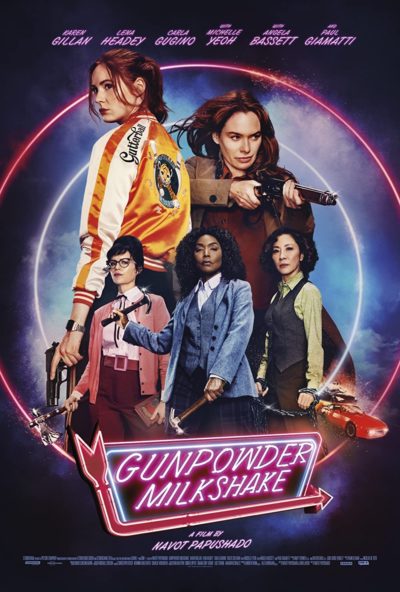 Said protagonist is Sam (Gillan), a killer with abandonment issues ever since her mom (Lena Headey) walked out on her, fifteen years earlier. Sam is tasked by her employer, Nathan (Giamatti), with recovering a haul of stolen cash. But she finds the thief was coerced into action, after his eight-year-old daughter (“8¾!”, as we are reminded on several occasions), Emily, was kidnapped. Likely reminded of her younger self, Sam takes custody of Emily, though the cash is destroyed in the process. This, and a previous job where she killed the son of a very important person, makes her persona non grata, and the hunter becomes the hunted.
Said protagonist is Sam (Gillan), a killer with abandonment issues ever since her mom (Lena Headey) walked out on her, fifteen years earlier. Sam is tasked by her employer, Nathan (Giamatti), with recovering a haul of stolen cash. But she finds the thief was coerced into action, after his eight-year-old daughter (“8¾!”, as we are reminded on several occasions), Emily, was kidnapped. Likely reminded of her younger self, Sam takes custody of Emily, though the cash is destroyed in the process. This, and a previous job where she killed the son of a very important person, makes her persona non grata, and the hunter becomes the hunted. It is notable that the film is split firmly along gender lines. with every one of the protagonists being women, and every one of the antagonists being men. However, it’s fortunate that seem largely to be about the extent of the messaging, and nobody particularly pays attention to this. Everyone is kept quite busy trying to kill each other. It’s also a bit less of an ensemble piece than I expected from the trailer. Especially in the first half, it’s Sam vs. the World, with the Librarians introduced, and then shuffled off to one side until Sam is ultimately forced to turn to them for help. That’s not particularly a criticism. I like Gillan, who was born about 25 miles from where I was, so is likely the nearest I have to a local action heroine. She can carry a film perfectly well, even if I’d rather have heard her natural Scots accent.
It is notable that the film is split firmly along gender lines. with every one of the protagonists being women, and every one of the antagonists being men. However, it’s fortunate that seem largely to be about the extent of the messaging, and nobody particularly pays attention to this. Everyone is kept quite busy trying to kill each other. It’s also a bit less of an ensemble piece than I expected from the trailer. Especially in the first half, it’s Sam vs. the World, with the Librarians introduced, and then shuffled off to one side until Sam is ultimately forced to turn to them for help. That’s not particularly a criticism. I like Gillan, who was born about 25 miles from where I was, so is likely the nearest I have to a local action heroine. She can carry a film perfectly well, even if I’d rather have heard her natural Scots accent.
















 Certainly the kind of action film for which you need to suspend your disbelief. In this case, the closest parallel is, as the tag-line above implies, the Jason Statham vehicle, Crank. In it, Statham’s character was poisoned, and had to keep his adrenaline permanently up for the rest of the film. to avoid dying. Here, it’s almost the reverse. Beckinsale’s character, Lindy, was born with a rare condition, “intermittent explosive disorder”. This is pretty much what it sounds like: uncontrollable aggressive outbursts, like a physical version of Tourette’s. This is a real thing. Not so real? Lindy is also “blessed” with high levels of cortisol, which make her faster and stronger than anyone else. Somewhere in the middle? Lindy controls her IED with electric shocks from a handheld device given to her by her therapist, Dr. Munchin (Tucci). All told, I’m tagging this as SF. #ChangeMyMind
Certainly the kind of action film for which you need to suspend your disbelief. In this case, the closest parallel is, as the tag-line above implies, the Jason Statham vehicle, Crank. In it, Statham’s character was poisoned, and had to keep his adrenaline permanently up for the rest of the film. to avoid dying. Here, it’s almost the reverse. Beckinsale’s character, Lindy, was born with a rare condition, “intermittent explosive disorder”. This is pretty much what it sounds like: uncontrollable aggressive outbursts, like a physical version of Tourette’s. This is a real thing. Not so real? Lindy is also “blessed” with high levels of cortisol, which make her faster and stronger than anyone else. Somewhere in the middle? Lindy controls her IED with electric shocks from a handheld device given to her by her therapist, Dr. Munchin (Tucci). All told, I’m tagging this as SF. #ChangeMyMind















